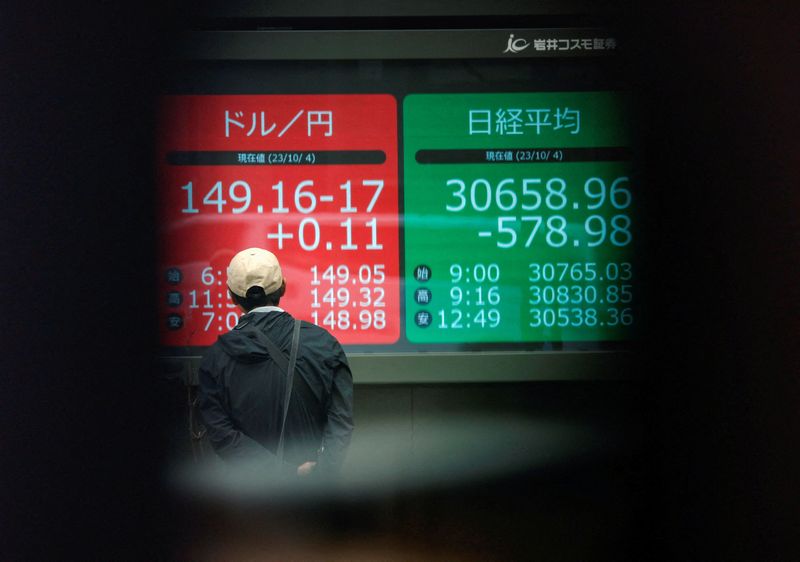Asia stocks dither ahead of Fed meeting; Japan Q3 GDP in focus
By Leika Kihara
TOKYO (Reuters) - Japan's new interpretation of "excessive" yen volatility is aimed at keeping investors on guard rather than lowering the threshold for actual intervention, say experts, who expect yen bears to remain resilient until domestic monetary conditions tighten.
Japanese authorities have traditionally defined excessive moves as an abrupt spike or plunge in the yen that happen in a short period of time, such as in a single day or a week, and driven by speculative traders.
But top currency diplomat Masato Kanda said on Wednesday that steady yen falls over a protracted period could also warrant stepping into the market, suggesting that Tokyo was giving itself wider scope to intervene to prop up the currency.
"If currencies move too much on a single day or, say, a week, that's judged as excess volatility," Kanda told reporters.
"Even if that's not the case, if we see one-sided moves accumulate into very big moves in a certain period of time, that's also excess volatility," he said.
Based on this definition, the yen's fall by around 12% so far this year could be deemed "excessive," some analysts say.
The remarks came in the wake of choppy trading on Tuesday, when the yen jumped abruptly after breaching the psychologically important 150 per dollar mark - a move some traders suspected was caused by Tokyo's yen-buying intervention.
While money flow data suggest there was no intervention, the price action was enough to keep yen bears at bay. The dollar/yen has stayed below 150 since Wednesday and was fetching 148.60 on Friday.
Tokyo last intervened to buy yen in September and October last year, when the currency eventually slumped to a 32-year low of 151.94 per dollar.
Analysts and experts with knowledge of Japanese currency policy doubt there has been a big change in Tokyo's threshold for intervention, which is ambiguous and not set in stone.
Rather, the remarks by Kanda were likely a fresh warning shot to markets that authorities could step in any time - even if yen moves were moderate, they say.
"The whole purpose of intervention is to keep markets on edge, so it's important that authorities signal they can step in any time," said Atsushi Takeuchi, a former central bank official who was involved in Tokyo's foray into the market a decade ago.
"Authorities likely won't see a strong need to intervene even if the yen slides below 150 again, as long as the moves are slow," he said. "They're probably waiting for the market to reverse itself."
YIELD PAYOFF
The yen has been under strong selling pressure for months particularly due to the Bank of Japan's resolve to maintain ultra-low rates even as other major economies, led by the U.S. Federal Reserve, have embarked on sweeping policy tightening since last year.
The BOJ holds short-term rates at -0.1%, a sharp contrast to the Fed's benchmark rate which is now at 5.25%-5.50%. While markets are betting the BOJ will end negative rates in coming months, any such move will still keep short-term borrowing costs stuck around zero and leave the yen vulnerable to further weakness.
There is uncertainty on how long authorities could prevent the yen from plunging again as rising U.S. Treasury yields keep upward pressure on the dollar, traders say, though Tokyo's new verbal tactics may slow down the pace of its currency's falls for now.
"The jawboning may put up a barrier for the yen around 150 for now, but I don't think it would prevent traders from attacking the threshold for too long," said Daisaku Ueno, chief currency strategist at Mitsubishi UFJ (NYSE:MUFG) Morgan Stanley Securities.
"After all, what determines dollar/yen levels is the interest rate differential between the United States and Japan."
Even though the 10-year Japanese government bond (JGB) yield has crept up to a more than one-year high of 0.805% on Wednesday, the gap between U.S. and Japanese 10-year yields has widened to 4 percentage points from roughly 1 percentage point at the start of the year.
Intervention isn't the best tool to arrest steady yen declines anyway, said former currency diplomat Hiroshi Watanabe.
"There's no point intervening when yen moves are gradual," Watanabe told Reuters. "Intervention is effective only when you know private funds will follow you in the same direction," he said. "I don't think that's the case now."
